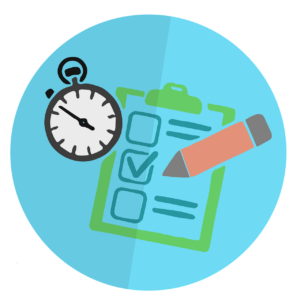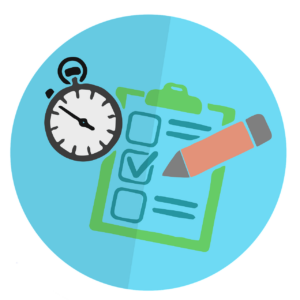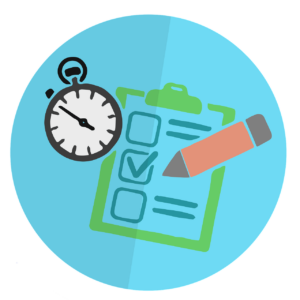Are you considering a career in nursing? If so, you’ll need to prepare for a nursing entrance exam. This exam is designed to test your knowledge and skills in various areas, including math, science, and critical thinking. It can be a challenging test, but with the right preparation, you can enhance your test-taking skills and increase your chances of success.
In this article, we’ll explore some tips and strategies to help you prepare for the nursing entrance exam. You’ll learn about the exam format and content, how to create a study plan, and the best test-taking strategies.
We’ll also discuss how to build your knowledge base, manage test anxiety, and take practice exams. By following these tips, you’ll be well on your way to acing the nursing entrance exam and pursuing your dream of becoming a nurse.
Key Takeaways
- Research the exam format and content and create a study plan accordingly.
- Use study materials specifically designed for nursing entrance exams and practice test-taking strategies.
- Build a strong foundation of knowledge in healthcare subjects and seek guidance from experienced professionals.
- Manage test anxiety with relaxation techniques and positive affirmations, and simulate exam conditions to prepare for the actual exam.
Understand the Exam Format and Content
You’ll want to familiarize yourself with the format and content of the nursing entrance exam so you know what to expect and can prepare accordingly. This means researching the exam preparation techniques that are available to you, such as review books, study guides, and online resources. These resources can help you gain an understanding of the types of questions you can expect to see on the exam and the format in which they will be presented.
Common nursing entrance exam topics include anatomy and physiology, chemistry, biology, mathematics, and English comprehension. You’ll want to make sure you have a solid understanding of these topics before test day.
Additionally, some exams may also include questions related to nursing ethics and patient care.
By understanding the exam format and content, you can focus your study efforts on the areas that will be most heavily tested and increase your chances of success on the nursing entrance exam.
Create a Study Plan
Planning out your study schedule is essential for success in the upcoming nursing entrance exam. Time management is crucial when creating a study plan. You should start by determining how much time you have before the exam and how much time you can allocate to studying each day.
Be realistic about how much time you can dedicate to studying, and make sure you include time for breaks and other activities.
Once you have a good understanding of your schedule, you can start to think about study materials. Look for materials that are specifically designed for nursing entrance exams, such as practice tests and study guides. These materials can help you understand the format and content of the exam, and they can also help you identify areas where you need to focus your studying.
Make sure you choose high-quality materials and don’t rely solely on online resources.
Finally, remember to be flexible with your study plan. If you find that a particular method isn’t working for you, don’t be afraid to adjust your plan accordingly.
Practice Test-Taking Strategies
Don’t let test anxiety get the best of you – by implementing effective strategies, acing the nursing entrance exam is within reach.
One of the key strategies to employ is guessing tactics. Remember that unanswered questions automatically earn you zero points, so if you’re unsure of an answer, it’s better to take a guess than leave it blank. Even if you don’t know the answer, you can use context clues, process of elimination, and educated guessing to increase your chances of getting it right.
Another important strategy is time management. You don’t want to spend too much time on one question and then run out of time for the rest of the exam. So, when you first receive the test, take a quick scan of the questions to get a sense of what’s ahead. Then, prioritize the questions by difficulty and allocate your time accordingly.
If you’re stuck on a particularly difficult question, don’t be afraid to skip it and come back to it later. Remember, every question is worth the same amount of points, so it’s better to answer as many questions as you can rather than get stuck on one.
Build Your Knowledge Base
Building a strong foundation of knowledge in various subjects related to healthcare can greatly increase your chances of success on the nursing entrance exam. To do this, you need to review resources that cover the specific topics that will be on the exam. These resources can include textbooks, study guides, online courses, and practice tests.
Make sure you’re using reputable resources that are up-to-date with the latest information and trends in healthcare. Additionally, seeking guidance from experienced nurses or healthcare professionals can also help you build your knowledge base. They can provide you with valuable insights on what to expect on the exam and what areas to focus on.
You can also ask them for tips on how to study effectively and manage your time during the exam. Remember, the more knowledge you have, the more confident you’ll feel when taking the nursing entrance exam.
Manage Test Anxiety
Managing test anxiety can be challenging, but it’s important to stay calm and focused during the exam. One way to manage test anxiety is to practice relaxation techniques beforehand. Some examples of these techniques include deep breathing exercises, progressive muscle relaxation, and visualization. These techniques can help calm your nerves and clear your mind, allowing you to better focus on the exam questions.
Another way to manage test anxiety is to use positive affirmations. These are statements that you repeat to yourself to help build confidence and reduce anxiety. Examples of positive affirmations include "I am prepared for this exam,""I am capable of doing well,"and "I trust in my abilities."By repeating these affirmations to yourself before and during the exam, you can help calm your nerves and stay focused on the task at hand.
| Negative Thoughts | Neutral Thoughts | Positive Affirmations |
|---|---|---|
| "I can’t do this" | "This is challenging" | "I am capable of doing well" |
| "I’m going to fail" | "I don’t know this yet" | "I have prepared for this exam" |
| "I never do well on tests" | "I need to focus on the question" | "I trust in my abilities" |
| "I’m not smart enough" | "I can ask for help if needed" | "I am confident in my knowledge" |
Remember, managing test anxiety is all about finding what works best for you. By incorporating relaxation techniques and positive affirmations, you can help calm your nerves and stay focused during the exam.
Take Practice Exams
To enhance your test-taking skills, it’s important to take practice exams. Simulating exam conditions during your practice will help you get a feel for the real thing.
Evaluating your performance after each practice test will help you identify your strengths and weaknesses. This will allow you to adjust your study plan accordingly and improve your chances of success on the actual nursing entrance exam.
Simulate Exam Conditions
By replicating testing conditions, you can improve your ability to perform well on the nursing entrance exam. Practice exams are a great way to get familiar with the types of questions and format of the test, but they may not fully prepare you for the actual experience of taking the exam. That’s why it’s important to simulate exam conditions as closely as possible.
Here are some ways to simulate exam conditions:
- Find a quiet, distraction-free space to take the practice exam
- Set a timer for the same amount of time as the actual exam
- Use only the materials allowed during the actual exam
- Do not take any breaks during the practice exam
By following these guidelines, you can better prepare yourself for the pressure and time constraints of the nursing entrance exam. Practicing under exam conditions can also help you develop better time management skills, which will be crucial on test day. So, take the time to simulate exam conditions during your exam preparation and give yourself the best chance for success.
Evaluate Your Performance
As you evaluate how well you performed on the simulation exam, focus on identifying your strengths and weaknesses. Tracking your progress is important to know where you stand and what areas you need to improve on. One way to do this is to create a table with two columns and four rows. In the first column, list down the topics covered in the exam. In the second column, rate your performance on each topic.
| Topics Covered | Rating |
|---|---|
| Anatomy and Physiology | 3/5 |
| Chemistry | 4/5 |
| Biology | 2/5 |
| Mathematics | 5/5 |
By doing this, you will be able to see which topics you need to focus more on. For example, if you scored low on Biology, you can allocate more study time to that subject. Identifying your weaknesses is crucial because it allows you to develop a study plan that is specific to your needs. This will help you improve your chances of passing the nursing entrance exam and ultimately, become a successful nurse.
Evaluating your performance on a simulated exam is a great way to prepare for the real thing. By tracking your progress and identifying your weaknesses, you can create a study plan that is tailored to your needs. With dedication and hard work, passing the nursing entrance exam is achievable.
Adjust Your Study Plan as Needed
Now that you’ve evaluated your performance, it’s time to adjust your study plan as needed. This means taking a step back and analyzing what worked and what didn’t work in your previous study approach.
You may need to re-evaluate your study materials, schedule, or even seek additional support from a study group or tutor. Remember, this process is about finding what works best for you and your learning style.
To ensure effective time management, set specific goals and allocate time for each subject or topic. This will help you avoid cramming and allow for consistent review throughout your study period.
Additionally, consider joining a study group to benefit from collective knowledge, support, and motivation. Studying with others can also provide an opportunity for discussion and clarification of difficult concepts.
Keep in mind that the most important thing is to stay focused, disciplined, and determined in your study efforts.
Frequently Asked Questions
What is the passing score for the Practice Nursing Entrance Exam?
To answer your question, the passing score for any exam is determined by the organization administering it. Therefore, the passing score for the Practice Nursing Entrance Exam will depend on the specific requirements set by the nursing program or institution.
However, with the right preparation techniques, you can increase your chances of achieving a passing score. It’s important to familiarize yourself with the content and format of the exam, practice time management, and use study materials such as practice tests and review books.
By implementing these strategies, you can feel confident and well-prepared on exam day.
How often is the Practice Nursing Entrance Exam administered?
You may be wondering about the frequency and schedule of the practice nursing entrance exam. The exam is typically administered multiple times a year, depending on the school or program you’re applying to.
It’s important to check with the specific institution to determine when the exam will be offered and when the application deadline is. Some schools may offer the exam once a year, while others may offer it multiple times throughout the year.
It’s important to plan ahead and schedule your exam in advance to ensure that you have enough time to prepare and submit your application before the deadline.
Are there any accommodations available for test-takers with disabilities?
If you have disability needs, accommodations are available for test-takers like you. The testing center is committed to providing equal opportunities for all test-takers, regardless of their disabilities.
You can request accommodations such as extended testing time, large-print test materials, or a private testing room. It’s important to inform the testing center of your disability needs ahead of time, so they can make the necessary arrangements.
Rest assured that the testing center will do everything they can to ensure a fair and comfortable testing experience for you.
Can test-takers use calculators during the exam?
You may be wondering if you can use a calculator during the exam. The answer is, it depends on the specific test you’re taking.
Some exams allow calculator usage, while others do not. However, even if a calculator is permitted, it’s important to remember that relying too heavily on it can actually slow you down.
In general, it’s best to brush up on your mental math skills and use the calculator sparingly for more complex calculations.
As part of your overall test-taking strategy, it’s also a good idea to familiarize yourself with the exam format and any rules regarding calculator usage ahead of time.
This way, you can focus on answering the questions to the best of your ability without getting bogged down by unnecessary calculations.
What is the cost of taking the Practice Nursing Entrance Exam?
If you’re wondering about the cost of taking the practice nursing entrance exam, the answer depends on the specific exam you’re taking and where you’re taking it.
However, what’s really important to focus on is the value of taking practice tests in general. By regularly practicing your test-taking skills, you can improve your performance and reduce test anxiety. Test taking strategies can be honed through practice, and you can learn how to better manage your time, stay focused, and approach questions strategically.
Ultimately, investing in practice tests can help you achieve a higher score on the actual exam and increase your chances of success in your nursing career.
Conclusion
Congratulations! You’ve made it to the end of this article on enhancing your test-taking skills for the nursing entrance exam.
By now, you should have a better understanding of the format and content of the exam, and have created a study plan that works for you. You’ve also learned some valuable test-taking strategies and tips for managing test anxiety.
Remember, building your knowledge base is essential for success on the nursing entrance exam. Take advantage of study resources and practice exams to solidify your understanding of key concepts and test your knowledge. And don’t forget to manage your test anxiety by practicing relaxation techniques and building your confidence.
By following these tips and techniques, you’ll be well on your way to acing the nursing entrance exam and starting your journey towards becoming a licensed nurse. Good luck!





















































































































































